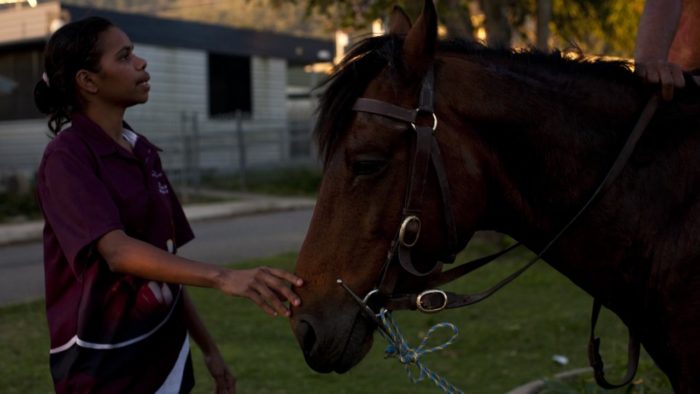True Crime Tuesdays: The Tall Man (2011)
Review Overview
Cinematography
7Score
7Evocativeness
7Helen Archer | On 21, Apr 2020
Every other Tuesday, our resident true crime obsessive gets their fix with a documentary film or series. We call it True Crime Tuesdays.
In the days of multi-episode true crime extravaganzas, it comes as something of a shock to remember a simpler time, of the stand-alone, one-off documentary. At a pared-back running time of 80 minutes, Tony Krawitz’s 2011 film The Tall Man, based on the book by Chloe Hooper, is an altogether quieter affair, almost a throwback to the output of public service channels. And yet the story, unhurriedly told, is one that’s sadly all-too-familiar in the era of social media.
In 2006, Cameron Doomadgee was arrested for being drunk and disorderly on Palm Island, Queensland, home to an Aborigine community – many of whom, historically, had been removed from their parents and sent to live there with white missionaries. Within 45 minutes of allegedly swearing at a policeman, Senior Sergeant Chris Hurley, the mild-mannered Cameron would be dead. Hurley is the ‘tall man’ of the title – at 6ft 7, and weighing 115 kg, in the opening of the film he is likened to a boogieman of childhood nightmares. But his sheer size becomes increasingly relevant when the nature of Cameron’s injuries are revealed; the cause of death was ruled to be a massive force to the abdomen, which broke four ribs and all-but severed his liver. Such injuries, it is stated here, are most often seen in road deaths, after sudden and severe car collisions. There were also bruises of his jaw, forehead, and eye.
Family and friends are interviewed, who all speak to the grief and sense of injustice felt after his death – feelings shared not just by those who loved him, but by the Aborigine community as a whole. Riots broke out in the immediate aftermath, with the police station and Hurley’s house being burned down, leading to widespread arrests. Further protests erupted when the coroner implicated Hurley in Cameron’s death, which ultimately resulted in him being charged with manslaughter. Meanwhile, the police organised counter-protests, marching on parliament in support of Hurley.
Lawyers, journalists, doctors and activists are all interviewed here, along with a representative of the police union – although Hurley refused to take part. What transpires is a picture of a man with anger management issues, who had a history of violence in his treatment of Aborigines, even though he had previously been vocal in his attempts to advocate for them. The community was split between the indigenous population and the white population, who express their disbelief that Hurley could be capable of such a thing, while the police put the full force of their weight behind him. The collusion in the immediate aftermath of Cameron’s death takes 5 years to be uncovered, as does the belittlement of an Aborigine witness who described what he saw but was discredited on account of his background.
In many way, The Tall Man has the form of many contemporary true crime documentaries, following a linear timeline and leading up to a court case and the eventual verdict. But what separates this from more procedural programmes is the lyrical way in which it is filmed by Germain McMicking, and scored by Antony Partos and David McCormack. Near the start, there is a brief history of Palm Island itself, an idyllic location in which the Aborigine community who inhabit it are nonetheless beset by a historic and ongoing poverty, and all the problems which come with it – self-annihilation in the form of alcoholism, drug abuse, and high rates of suicide.
Cameron’s son Eric is interviewed over the course of the first half hour, and the grief of losing his beloved father looms over him like a physical weight. Cameron’s cellmate is a missing part of the film, and it transpires that he took his own life. But the entire documentary, from the heartbreaking interviews to the clips of the police reconstruction of the events which led to Cameron’s death, is intercut with the daily life of Palm Island itself – children playing, riding their bikes through the dusty streets, old ladies sitting in their garden smiling blissfully at the babies they hold, women swimming as the sun sets behind them, and horses galloping over deserted, unspoiled beaches.
The Tall Man is a subtle, yet atmospheric, investigation into police brutality, and the ways in which authoritarian power asserts itself over indigenous populations. Ending with Cameron’s partner reading out the statement she read in court, describing the simple but happy life she had imagined – of growing old with her husband and watching as their son became a man – it is not merely a moving tribute but an understated lament for all the lives torn asunder by the injustice at the heart of Palm Island, and of wider society.
The Tall Man (2011) is available on Sky Crime. Don’t have Sky? You can also stream it live and on-demand legally on NOW, for £9.99 a month, with no contract and a 7-day free trial. For the latest Sky TV packages and prices, click the button below.





















